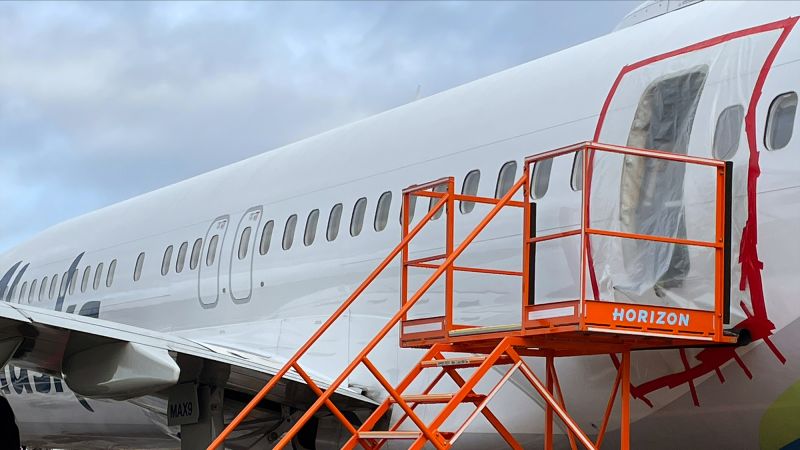The US Justice Department on Tuesday notified Boeing that it breached terms of its 2021 agreement in which the company avoided criminal charges for two fatal 737 Max crashes.
After a series of safety missteps earlier this year, including a door plug that blew off an Alaska Airlines flight shortly after takeoff in January, the Department of Justice said Boeing is now subject to criminal prosecution.
“For failing to fulfill completely the terms of and obligations under the [deferred prosecution agreement], Boeing is subject to prosecution by the United States for any federal criminal violation of which the United States has knowledge,” the Justice Department said in a letter to US District Judge Reed O’Connor in Fort Worth, Texas, who oversaw the prior agreement.
The Biden administration said in its letter that it has not yet determined how it will proceed, however, and Boeing will have an opportunity to respond to its breach of the agreement – and steps it has taken to remediate the situation – by June 13. It will let the court know by July 7 how it will proceed with the case.
The notification comes as the Justice Department conducts a new investigation into Boeing’s operations in the wake the door plug incident. The earlier deal had resolved a fraud investigation related to the company’s development of its 737 Max aircraft.
Under its deferred prosecution agreement from January 2021, Boeing paid $2.5 billion in penalties and promised to improve its safety and compliance protocols. Families of victims of the October 2018 Lion Air 737 Max crash and the March 2019 Ethiopian Airlines 737 Max crash had long denounced the delayed prosecution agreement, arguing it denied them justice for the deaths of their loved ones.
Families of victims and lawyers representing them met with the Justice Department late last month to persuade the Biden administration to end the agreement in light of multiple safety lapses at Boeing this year and in past years after the 2021 agreement was reached.
Following the April 2024 meeting, attorney Paul Cassell, who represents the victims’ families, said at a press conference that the deferred prosecution agreement was “rigged” and brokered without families’ say. Cassell pledged to hold Boeing accountable for its “fraud and misconduct.”
On Tuesday, Cassell said, “This is a positive first step, and for the families, a long time coming. But we need to see further action from DOJ to hold Boeing accountable, and plan to use our meeting on May 31 to explain in more detail what we believe would be a satisfactory remedy to Boeing’s ongoing criminal conduct.”
The Justice Department in its letter said it notified the families that Boeing breached its agreement, and it will continue to confer with families of the crash victims as well as other airline customers about next steps. The Department of Justice plans to meet with the families next on May 31.
In Thursday’s letter to the federal judge overseeing the prior agreement, the Justice Department said it had notified the company that “the government has determined that Boeing breached its obligations” in multiple parts of the 2021 deal “by failing to design, implement, and enforce a compliance and ethics program to prevent and detect violations of the U.S. fraud laws throughout its operations.”
Despite pledging to clean up its act, Boeing had a seemingly endless run of quality and safety lapses in the years since its deferred prosecution agreement.
On September 20, 2021, just months after its agreement, Boeing disclosed it found empty tequila bottles inside one of the two 747 jets being refurbished for use as the next generation of Air Force One.
In April 2023, Boeing announced its supplier used a “non-standard manufacturing process,” delaying deliveries of the 737 Max.
In February 2024, a month after the door plug incident, a preliminary National Transportation Safety Board investigation found that the plane left a Boeing factory missing the four bolts needed to secure the door plug. Later that month, the Federal Aviation Administration issued a report sharply critical of the culture at Boeing, citing “gaps in Boeing’s safety journey,” and gave Boeing 90 days to come up with a plan to fix its problems. Subsequent FAA reports found multiple problems with Boeing’s production practices following a six-week audit.
In March, the FAA identified more potential safety issues with the engines of the 737 Max and 787 Dreamliner.
Last month, the FAA announced an investigation into a whistleblower’s complaint that the company took shortcuts when manufacturing its 777 and 787 Dreamliner jets and that those risks could become catastrophic as the airplanes age. The company disputed the complaint.
This story has been updated with additional developments and context.
Read the full article here




